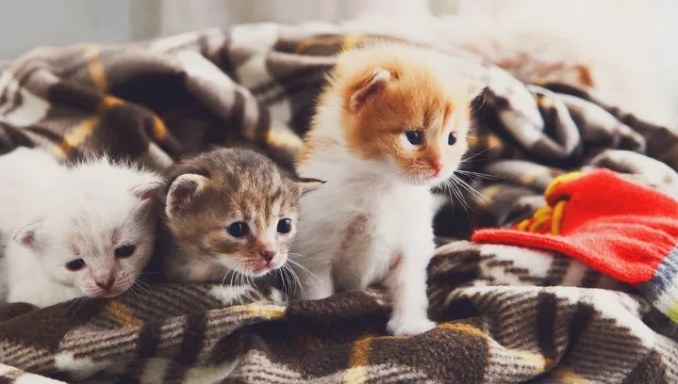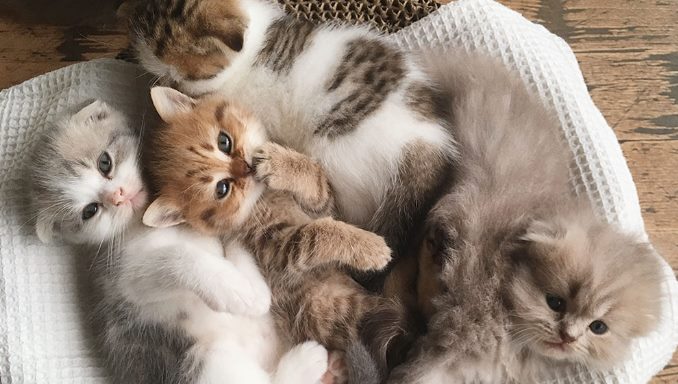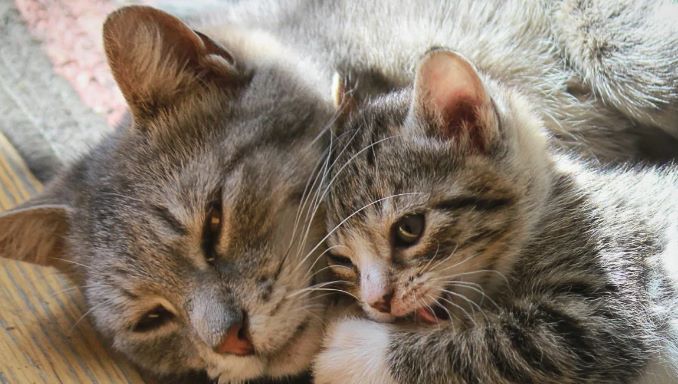When to Change Bedding after Cat Gives Birth?
When a mother cat gives birth, it is a special moment. The new kittens are so small and vulnerable, and the mother is there to protect them and care for them. It is amazing to see how the mother cat can take care of so many kittens at once. Watching a mother cat with her kittens is a truly wonderful sight.
When a cat gives birth, there are many things that need to be done in order to ensure the safety and health of the kittens. One of those tasks is changing the bedding often. But When to change bedding after cat gives birth? And what should you use for bedding? Keep reading to find out!
The function of bedding when the mother cat gives birth to kittens is to keep the newborn kittens clean, comfortable, and safe. It also helps to prevent the mother cat from accidentally crushing her kittens during the birthing process.
It is important to provide the mother cat with a clean, comfortable place to give birth. This will help to ensure that she has a healthy delivery and that her kittens are born healthy. Providing a clean, comfortable place for the mother cat to give birth is also important for her own health and well-being.
In this blog post, we’ll cover the basics of caring for a cat after she has given birth. We’ll also discuss when it’s time to change bedding and other items in your home to help ensure the safety of your feline friend and her newborn kittens. So, whether you’re a first-time cat owner or you’ve been through this before, be sure to read on!
See more: When Do Kittens Open Their Eyes? What To Know
How to Change Bedding After Cat Gives Birth
Your cat has just given birth to a litter of kittens, and you’re wondering how to change the bedding. Here’s what you need to know.
1. Make sure the area is clean. You don’t want your cat to give birth in a dirty area, so make sure the space is clean before she starts labor.
2. Have everything ready. Before your cat starts labor, gather everything you’ll need to change the bedding, including clean towels, sheets, and blankets.
3. Be gentle. When you’re changing the bedding, be gentle with your cat and her kittens. Handle them carefully so you don’t disturb or hurt them.
4. Keep the area warm. It’s important to keep the area warm for your cat and her kittens, so make sure the bedding is warm and the room is comfortable.
5. Don’t forget to change the litter box. In addition to changing the bedding, you’ll also need to change the litter box after your cat gives birth. Be sure to use a clean, fresh litter.
Following these tips will help you change the bedding after your cat gives birth without any problems.
When to Change Bedding after Cat Gives Birth?
It is important to change the bedding after a cat has given birth in order to ensure the health and safety of both the mother and her kittens. The frequency of changing will depend on a few factors, such as how many kittens were born and whether or not the mother cat is able to care for them herself. In general, it is best to change the bedding at least once a day for the first week after the kittens are born. After that, you can reduce the frequency to every other day or every few days, depending on the situation.
However, the first 24 hours after birth is the most important time for the mother and kittens to bond with each other, you should not disturb them during this time if possible. After the first day, it is okay to start changing the bedding more frequently.
If the mother cat is able to care for her kittens herself, then you won’t need to change the bedding as often. However, if the mother cat is not able to care for her kittens or if there are a lot of them, then you will need to change the bedding more often. It is also a good idea to change the bedding more often if the kittens are sick or if they have diarrhea.
The best bedding to use after a cat has given birth is a clean, soft material that will absorb moisture. This could be a towel, a cloth diaper, or even an old t-shirt. You don’t want to use anything that is too rough or that could irritate the mother’s skin. You also don’t want to use anything that is too absorbent, as this could cause the bedding to become wet and uncomfortable for the mother cat.
You should wash the bedding after a cat has given birth at least once a week. If the bedding is very soiled, you may need to wash it more often. It is also a good idea to have a spare set of bedding that you can use while the other set is being washed.
Caring for a Cat after She Gives Birth
Once the mother cat has given birth, there are a few things that you will need to do in order to care for her and her kittens. First, it is important to make sure that she has a clean, comfortable place to rest. This could be a bed, a box, or even a laundry basket lined with a towel. It is also important to make sure that she has access to food and water.
You should also check on the mother cat and her kittens regularly. This is to make sure that they are all doing well and that the mother cat is able to care for her kittens. If you see anything that concerns you, such as the mother cat not being able to care for her kittens or the kittens appearing to be sick, then you should take them to the vet right away.
It is also important to provide the mother cat with some privacy. This means that you should not handle her kittens too much or disturb them when they are sleeping. However, it is still important to check on them regularly to make sure that they are healthy and doing well.
After the first week, you can start to handle the kittens more often. However, you should still let the mother cat do most of the caretaking. Only handle the kittens when necessary, such as when you are cleaning them or when you need to check their health.
After your cat gives birth, you will need to take care of her and her kittens. Here are some tips on how to do that:
1. Give her plenty of rest. She will be exhausted after giving birth and will need to rest in order to recover.
2. Provide her with food and water. She will need extra nutrition to heal and care for her kittens.
3. Keep her area clean. Help her keep her nest clean and free of debris.
4. Monitor her temperature. After giving birth, your cat’s temperature will drop and she may be at risk for infection. Be sure to monitor her temperature and seek veterinary care if it drops too low.
5. Help her care for her kittens. Your cat will need help cleaning and feeding her kittens. Be sure to wash your hands before and after handling them.
6. Seek veterinary care if needed. If you have any concerns about your cat or her kittens, be sure to contact your veterinarian right away.
10 Things to Avoid When Taking Care of Cats After Birth
1. Avoid giving your cat a bath for at least two weeks after she gives birth. This can put her and her kittens at risk for hypothermia.
2. Do not try to handle or pick up the kittens too much in the first few days after they are born. The mother cat will do a good job of cleaning them and keeping them warm.
3. Do not move the kittens to a new location until they are at least two weeks old. This can be stressful for the mother and her kittens and can lead to illness.
4. Avoid using any type of cleaning products near the mother cat or her kittens. Many household cleaners contain chemicals that can be harmful to them.
5. Do not give the mother cat any vaccinations until her kittens are weaned. The vaccines can pass through her milk and make the kittens sick.
6. Do not feed the mother cat any type of food that is high in fat or protein. This can cause digestive problems for her and her kittens.
7. Avoid using any type of flea or tick products on the mother cat or her kittens. These products can be toxic to them.
8. Do not give the mother cat any medication that has not been prescribed by a veterinarian. Some medications can be harmful to her and her kittens.
9. Do not allow other animals to come into contact with the mother cat or her kittens. This can lead to disease and infection.
10. Do not handle the mother cat or her kittens too much. This can cause them to become stressed and can lead to illness.
Things to Prepare When the Mother Cat Gives Birth
1. A quiet, safe place for the mother and her kittens to spend the first few weeks. This could be a room in your home that can be closed off from other family members and pets, or even a separate building if you have one available. The space should be warm, draft-free, and equipped with everything the new family will need, including a litter box, bedding, food and water bowls, and toys.
2. Lots of clean towels. These will come in handy for everything from cleaning up after the birth to providing a warm place for the kittens to sleep.
3. A good quality kitten formula, in case the mother is unable to produce enough milk for her kittens.
4. A pet carrier, in case you need to take the mother or any of the kittens to the vet.
5. Patience, love, and understanding. Caring for a new mother and her kittens can be challenging at times, but it is also an incredibly rewarding experience.
FAQs
How soon can you pick up kittens?
Kittens can be picked up as early as 8 weeks old. Some shelters and rescue organizations will not release kittens to new homes before they are 12 weeks old. Kittens under 4 months old require more care than adult cats and may need to be bottle-fed or fed a special diet. Kittens also need to be vaccinated and spayed or neutered. Be sure to ask your veterinarian or shelter worker about the best time to pick up your new kitten.
Can I give my cat a bath after she gives birth?
It is best to avoid giving your cat a bath for at least two weeks after she gives birth. This can put her and her kittens at risk for hypothermia. The mother cat will do a good job of keeping her kittens clean and should not need a bath herself during this time.
Can I move the kittens to a new location?
If you need to move the kittens to a new location, make sure to do so slowly and carefully. Kittens are very fragile creatures, and moving them too quickly can cause them stress or even injure them. When moving the kittens, be sure to keep them in their carrier or another secure container so they don’t escape. Also, make sure the new location is safe for them, with no sharp objects or poisonous substances that they could get into. Lastly, don’t forget to provide them with food, water, and a litter box at their new location.
Can I use flea or tick products on the mother cat or her kittens?
Yes, you can use flea or tick products on the mother cat or her kittens. However, you should always consult your veterinarian first to make sure that the product is safe for use on cats and kittens. Some products may not be safe for use on very young kittens, so it is important to check with your vet before using any type of product on your cat or kitten.
Why does my cat keep laying on her kittens?
There are a few reasons why your cat might be laying on her kittens. One reason could be that she is trying to keep them warm. Another reason could be that she is trying to protect them from other animals or people. If you think your cat is doing this to protect her kittens, it is important to make sure that they are in a safe place where they cannot be harmed. If you are worried about your cat’s behavior, you should talk to your veterinarian.
Do mother cats reject their kittens if humans touch them?
There is no one answer to this question as mother cats can react differently when humans touch their kittens. Some mothers may become agitated or even attack their kittens if they feel that they are being threatened, while others may simply move away from the area where the human interaction is taking place. Ultimately, it is up to the individual cat and her own temperament as to how she will react in such a situation. If you are concerned that your presence may be upsetting the mother cat, it is best to avoid contact and let her care for her kittens in peace. But you can rest assured that in most cases, the mother cat will not abandon their kittens if you touch them!
Can a male cat be around newborn kittens?
Yes, a male cat can be around newborn kittens, but it is important to supervise closely to make sure the male cat does not hurt or stress the kittens in any way. It is best to introduce the male cat to the kittens gradually, starting with short periods of time together and gradually increasing the amount of time as the kittens get older and more comfortable around the male cat. Ultimately, whether or not a male cat can be around newborn kittens successfully will depend on the individual personalities and temperaments of the cats involved. Some males may do just fine while others may need to be kept separate from the kittens for their own safety.
Should I let my cat move her kittens?
There is no one answer to this question as it can depend on the individual cat and her kittens. Some mother cats may move their kittens around frequently while others may keep them in one spot most of the time. Ultimately, it is up to the mother cat to decide what is best for her kittens. If you are concerned that your cat is moving her kittens too much, you should talk to your veterinarian. They can help you determine if there is cause for concern and provide guidance on how to best care for your cat and her kittens.
Conclusion
Giving birth is a momentous occasion for any woman. It is also an important time for her cat. As a new mother, it is crucial to know when to change bedding after your cat gives birth. When a cat has kittens, there is a lot of work to be done. Among the many tasks that need to be completed, changing bedding is often one that is overlooked. Change the bedding frequently in order to prevent bacteria and infection from building up.
If you’re a new cat owner, you may be wondering how often you should change your pet’s bedding. It’s important to keep your cat’s environment clean, but you also don’t want to disturb the delicate balance of bacteria that keeps her healthy. By following these simple tips on this post, you can help keep your cat and her newborn kittens healthy and safe.
Above is the article “When to change bedding after cat gives birth?”, Thanks for reading!
Further reading:












Reading your article has greatly helped me, and I agree with you. But I still have some questions. Can you help me? I will pay attention to your answer. thank you.